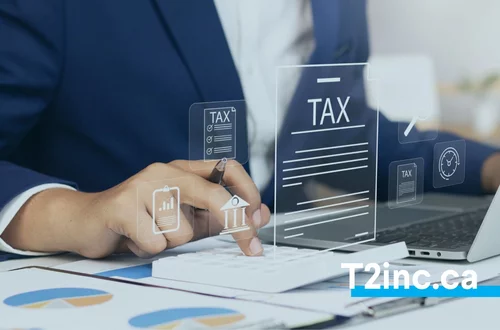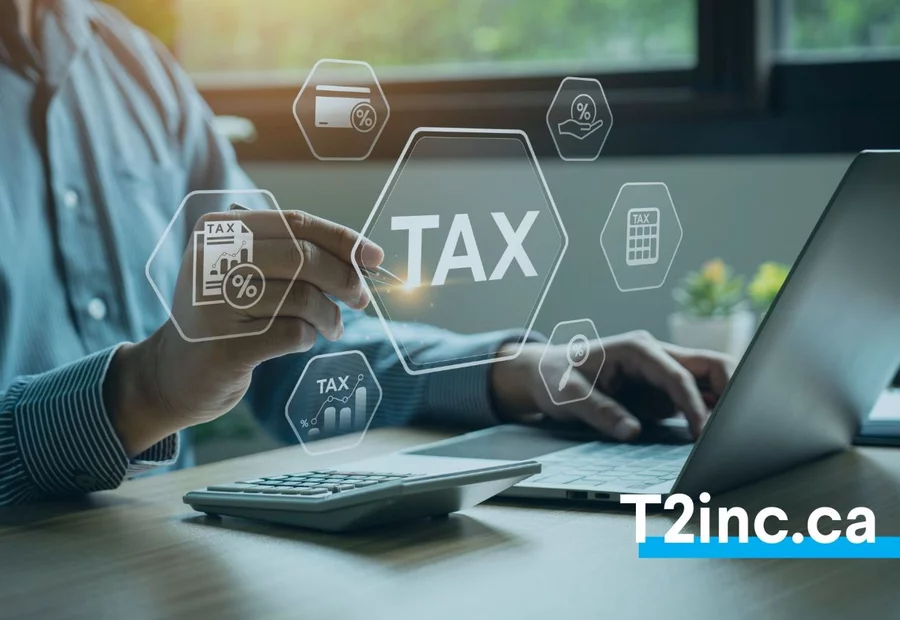BC corporate tax rate: complete guide for small business owners

Tax season is a challenging time for any small or medium-sized corporation in British Columbia (BC), especially when navigating different business tax rates in BC and federal tax obligations. Knowing when to file and which forms apply is only half the battle. There are also small business deductions, tax credits, and preferential tax treatments available depending on your corporation’s taxable income and activity type. All required forms are available through the Canada Revenue Agency (CRA).
The corporate tax professional at T2inc.ca offer a comprehensive guide to understanding the provincial and territorial income tax system, and filing your T2 corporate tax return correctly the first time for your BC small business.
Do small business owners need to file a tax return in BC?
In the province of BC, all corporations with a permanent address must file a T2 corporation income tax return. This includes corporations earning active business income carried on in Canada, whether subject to the lower small business rate or the general rate. If you operate in multiple jurisdictions, you must also declare all your provincial and territorial addresses in a supplemental form (Form 5).
If you are a sole proprietor or self-employed and not incorporated, you must report your business income on your personal tax return. This differs from how active business income earned by a corporation is taxed. This guide is intended for incorporated small and medium sized businesses.
How much can a small business make before paying taxes in BC?
In BC, incorporated small enterprises can earn up to $499,999 in active business income before losing access to the lower small business rate. This business limit aligns with the federal business limit, where income exceeding $500,000 is taxed at the general corporate tax rate.
If your income crosses the threshold during the year, your tax is calculated proportionally based on the number of days at each rate, reflecting changes during the tax year and ensuring an accurate corporation’s taxable income calculation.
What is the small business tax rate in BC?
In BC, there are two rates of corporate income tax: the general corporate income tax rate and the small business rate. The difference is significant: the general tax rate is 12%, while the small business tax rate is 2%.
General BC corporate income tax rate:
| Period | Tax rate |
| Effective January 1, 2018 | 12,0 % |
| April 1, 2013 – December 31, 2017 | 11,0 % |
| January 1, 2011 – March 31, 2013 | 10,0 % |
| January 1, 2010 – December 31, 2010 | 10,5 % |
| July 1, 2008 – December 31, 2009 | 11,0 % |
| July 1, 2005 – June 30, 2008 | 12,0 % |
| January 1, 2002 – June 30, 2005 | 13,5 % |
| July 1, 1993 – December 31, 2001 | 16,5 % |
Small business BC corporate income tax rate
| Period | Tax rate |
| Effective April 1, 2017 | 2,0 % |
| December 1, 2008 – March 31, 2017 | 2,5 % |
| July 1, 2008 – November 30, 2008 | 3,5 % |
| January 1, 2001 – June 30, 2008 | 4,5 % |
| July 1, 2000 – December 31, 2000 | 4,75 % |
| July 1, 1999 – June 30, 2000 | 5,5 % |
| January 1, 1999 – June 30, 1999 | 8,5 % |
Record keeping requirements in BC
When assessing your small business taxes, keeping proper records is key to ensuring you correctly report your taxable income, investment income, and any passive investment income. These distinctions affect your eligibility for credits and deductions and influence your overall corporate tax system obligations.
To ensure that you have the correct information of your business, include:
- The industry or business type that you have
- The format of your documentation for your business (electronic, paper or both)
- Identify if you have digitized your files
- If your operations in business also include an e-commerce platform
- If you are an employer
- If you are registered as a GST/HST business
In addition, it is important to declare these documents:
- Your incurred income for the tax year
- Any motor vehicle expenses and logbooks
- Business property records
It is a general rule to keep your previous tax receipts and records for up to 6 years in the case of an audit. If you are missing any documents or forms, you can access the forms you have on file by going to your My Business Account on the CRA website.
How to file corporate taxes in BC
As a corporation, once you file your T2 tax return, you must include Forms 427 and 5. It is also important to provide the appropriate documents when you are assessing your taxes.
Form 427
Using Form 427, this is the British Columbia Corporation Tax Calculation, you can claim and find your current amount due or owing. Using Part 1, you identify your eligible income and in Part 2, you multiply this figure by your tax rate.
Form 5
Form 5 is the CRA’s Tax Calculation Supplementary document where you claim your operating address, any territorial or provincial tax credits and if you have multiple locations. This is where you declare your tax calculated for all documents.
To file your corporate T2 tax return, assemble your documents, use a calculator, and add all of your respective income and expenditures. This is important to do and can take some time. Keep all of your evidence aside during your tax assessment.
You may file using a paper copy of your taxes or file online through the CRA or a third party software.
Avoid late fees or penalties for missing payments of installments by setting up direct deposit payment information. You can do this through your financial institution associated with your enterprise. If you have payments to make, this balance of tax is often paid 2-3 months after you file for your tax year.
To ensure that you are getting the most out of your tax return, it’s always a good idea to get a professional tax expert to help you assess your corporate finances. Using regular bookkeeping and digitizing all of your files makes this process simpler.
List of deductions and tax credits for BC corporations
As a BC corporation, you may have several avenues of expenditures and overtures. There are several tax credits available to you, including:
- Credit union tax reduction
- Logging tax credit
- Farmer’s food donation tax credit
- Small business venture capital tax credit
- Scientific research and experimental development (SR&ED) tax credit
- SR&ED refundable tax credit
- SR&ED non-refundable tax credit
- Recapture of BC SR&ED tax credit
- Qualifying environmental trust tax credit
- Film and television tax credit
- Production services tax credit
- Mining exploration tax credit
- Book publishing tax credit
- Training tax credit
- Interactive digital media tax credit
- Shipbuilding and ship repair industry tax credit
Where to find help with small business taxes in BC
As a small business or growing medium-sized enterprise in BC, navigating corporate income tax rules can be overwhelming. Whether you fall under the lower rate or the general rate, a tax professional can help ensure you're fully eligible for the lower small business rate and not misclassifying income.
T2inc.ca is dedicated to helping you run your business with accounting solutions that are ideal for small businesses. Contact us today for peace of mind.
- Do small business owners need to file a tax return in BC?
- How much can a small business make before paying taxes in BC?
- What is the small business tax rate in BC?
- Record keeping requirements in BC
- How to file corporate taxes in BC
- List of deductions and tax credits for BC corporations
- Where to find help with small business taxes in BC
Contact our experts
Have a question? Need help? Fill out our online form to get help from our experts.
Contact usNeed more help?
Contact us by filling out our form
Are you interested in our services, but would like more information before taking the plunge? Contact us today and one of our tax accountants will be in touch to help you.
At T2inc.ca, we're committed to helping business owners manage their company's tax affairs so they can grow their business.




